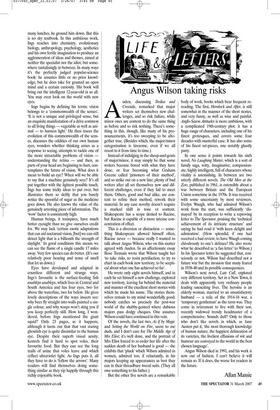Angus Wilson taking risks
Auden, discussing Troilus and Cressida, remarked that major writers set themselves new challenges, and so risk failure, while minor ones are content to do the same thing as before and so risk nothing. There’s something in this, though, like many of his pronouncements, it’s too sweeping to be altogether true. (Besides which, the major/minor categorisation is tiresome, even if we all resort to it from time to time.) Instead of indulging in the sheep-and-goats of major/minor, it may simply be that some writers become bored with what they have done, or fear becoming what Graham Greene called ‘prisoners of their method’, and so strike out on a new line; plenty of bad writers after all set themselves new and different challenges, even if they fail to meet them. Others, good and bad alike, are content to refine their method, rework their material. In any case novelty doesn’t require a marked shift in tone or content. Shakespeare has a scope denied to Racine, but Racine is capable of a more intense concentration of effect.
This is a diversion or distraction — something Shakespeare allowed himself often, Racine never — because really I wanted to talk about Angus Wilson, who on this matter agreed with Auden. In an affectionate essay Rose Tremain wrote that Wilson taught her ‘to take risks, to resist petrifaction, to try to chart in each book new territory, to be sceptical about what one has achieved so far’.
He wrote only eight novels himself, and in each he set himself a new challenge, explored new territory, leaving far behind the material and manner of the excellent short stories with which he made his name. The stories themselves remain to my mind wonderfully good; nobody catches so precisely the post-war world of the shabby-genteel where dubious majors pass dodgy cheques. One assumes Wilson could have continued in this vein.
Of the novels, the last two, As if by Magic and Setting the World on Fire, seem to me duds, and I don’t care for The Middle Age of Mrs Eliot; it’s well done, and the portrait of Mrs Eliot forced to re-order her life after the sudden death of her husband is good — she exhibits that ‘pluck’ which Wilson admired in women, admired too, if reluctantly, in his majors keeping up appearances as best they can in their threadbare tweed suits. (They all owe something to his father.) But the other five novels are a remarkable body of work, books which bear frequent rereading. The first, Hemlock and After, is still somewhat in the manner of the short stories, and very funny, as well as wise and painful. Anglo-Saxon Attitudes is more ambitious, with a complicated 19th-century plot; it has a huge range of characters, including one of his finest grotesques, and covers some four decades with masterful ease. It has also some of his finest set-pieces, one notably ghastly party.
In one sense it points towards his sixth novel, No Laughing Matter, which is a sort of family saga, witty, imaginative, compassionate, highly intelligent, full of characters whose vitality is astonishing. In between are two utterly different novels. The Old Men at the Zoo, published in 1961, is ostensibly about a war between Britain and the European Union sometime in the 1970s. It was received with some uncertainty by most reviewers. Evelyn Waugh, who had admired Wilson’s work from the start, was sufficiently ‘dismayed’ by its reception to write a reproving letter to The Spectator, praising the ‘technical achievement of its intricate structure’ and saying he had read it ‘with keen delight and admiration’. (How splendid, if one had received a bad review, to have Waugh coming chivalrously to one’s defence! He also wrote what he described as ‘a fan letter’ to Wilson.) In his Spectator letter he suggested that, consciously or not, Wilson had described not a future war but the invasion that many feared in 1938-40 and its possible consequences.
Wilson’s next novel, Late Call, explored very different territory. Set in a New Town, it deals with apparently very ordinary people leading unexciting lives. The heroine is an elderly woman, married to an unsatisfactory husband — a relic of the 1914-18 war, a ‘temporary gentleman’ as the term was. They come in retirement to live with their son, recently widowed trendy headmaster of a comprehensive. Sounds dull? Only to those who don’t like novels in which, as Jane Austen put it, ‘the most thorough knowledge of human nature, the happiest delineation of its varieties, the liveliest effusions of wit and humour are conveyed to the world in the best chosen language’.
Angus Wilson died in 1991, and his work is now out of fashion. I can’t believe it will remain so. If it does, the worse for readers in the future.
Allan Massie










































































 Previous page
Previous page